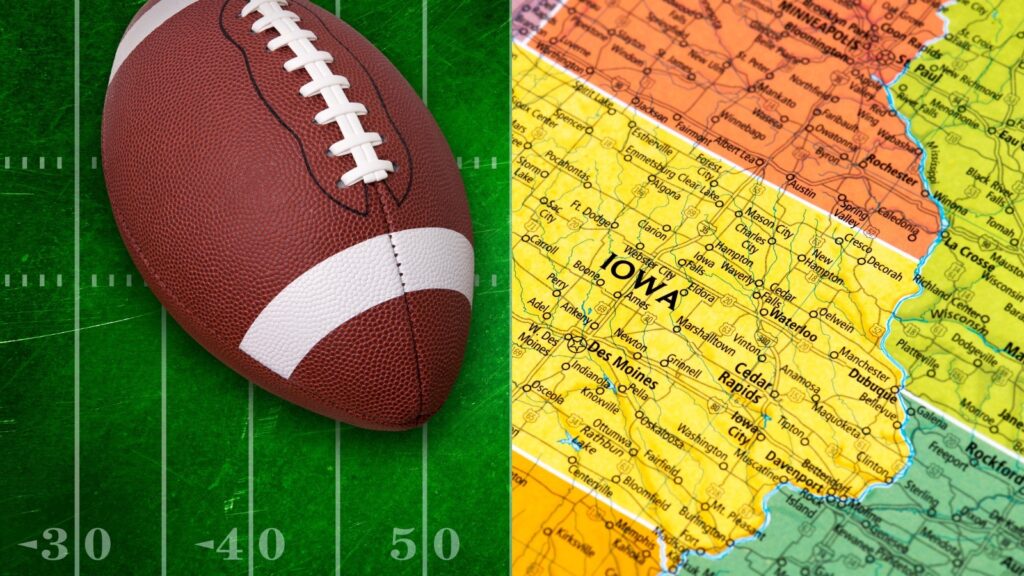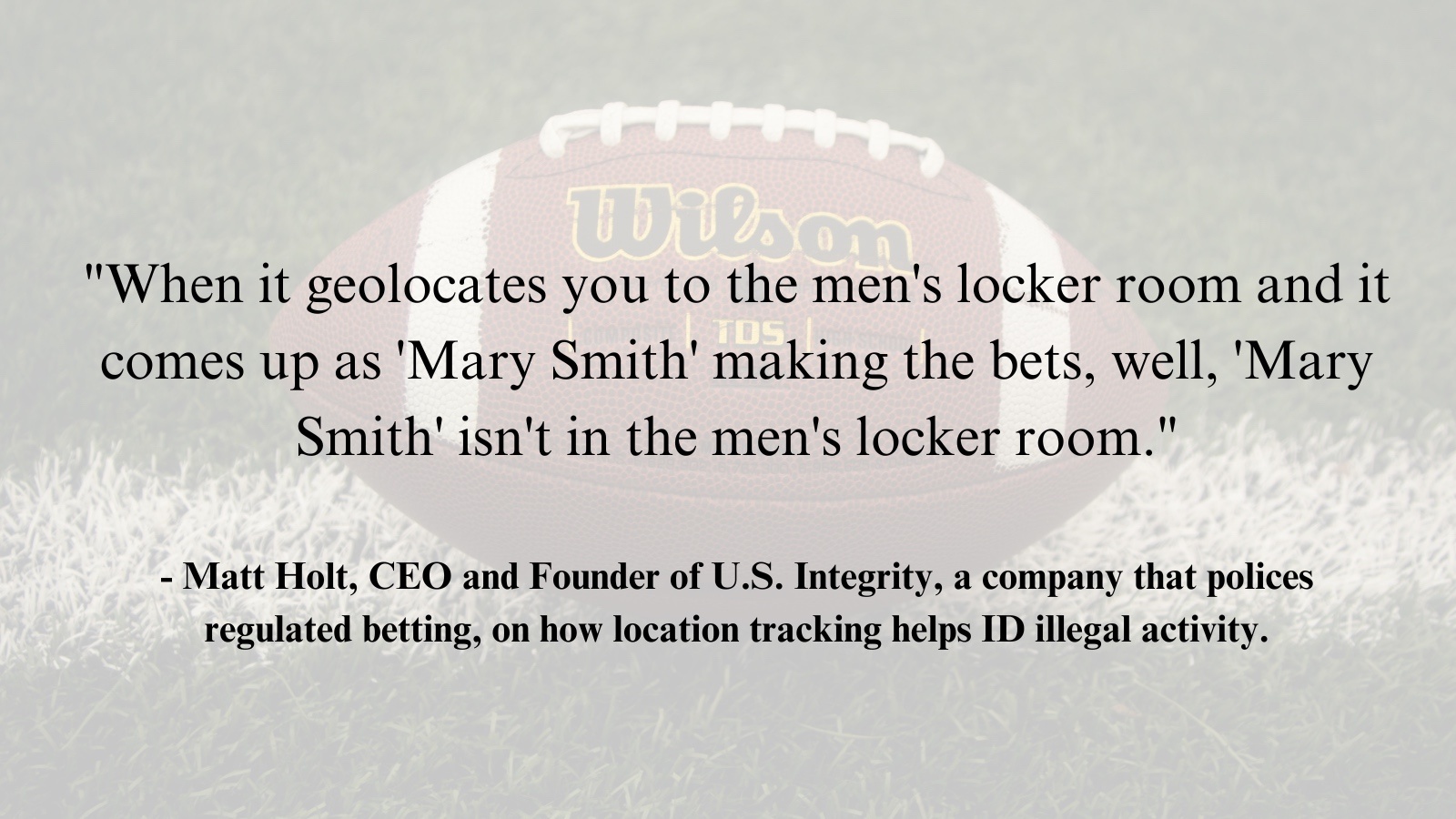Exclusive: College Betting Scandal Q&A With U.S. Integrity CEO Matt Holt

Promo Code: BOOKIES
Gambling-related investigations, penalties, fines, firings and the potential of jail time for athletes, have roiled college sports in 2023.
Alleged illegal college football betting by athletes at Iowa and Iowa State have resulted in seven current or former athletes being charged with records tampering. NCAA rules prohibit student-athletes from betting on any NCAA-backed sport at any level. Penalties can vary depending on the amount of the wagers and the events in question.
Gambling is illegal in Iowa for those under 21 in Iowa, as is knowingly allowing someone under 21 to wager on betting apps. The Iowa and Iowa State athletes allegedly made illicit wagers via DraftKings and FanDuel mobile apps. Some used the names and information of family members in setting up their accounts.
In May, Alabama's baseball coach Brad Bohannon was fired after an investigation found the coach was on the phone with a someone in Ohio who was placing large wagers on Alabama to lose a game to LSU, set to be played at the Great American Ballpark in Cincinnati.
One common denominator in all these cases is U.S. Integrity. The company is an FBI of Sports Betting. Its mission is to alert customers – teams, leagues, sportsbooks, and conferences – to suspicious betting activity.
This year, representatives of U.S. Integrity will speak to athletes at each school in the SEC and Big 12 about the perils of betting, and the technology in place that makes illegal betting on an online platform virtually impossible to hide.
RELATED: Future of College Betting Clouded by Scandal
Matt Holt founded U.S. Integrity to 'ensure that every sporting competition is fair and transparent.' Photo Courtesy of U.S Integrity.com
‘The System Is Working’
U.S. Integrity CEO and Founder Matt Holt has been busy in 2023. Bookies.com caught up with Holt and spoke with him for about 30 minutes via Zoom from his company’s office in Las Vegas. His company ends up investigating about 1 in every 500 events in which betting is offered.
The legalization of betting and the technology that surrounds it has made these sorts of investigations possible, if not inevitable.
“There is no anonymous wagering. There's no hiding these bets,” Holt said. “And because that transparency and that heightened level of transparency is there, I do think it's significantly harder,” Holt said. “We see some people say, ‘Oh my goodness, this is what's wrong with legal sports betting.’ But we on the regulated compliance side say, ‘No, this is what's right.’ It proves the system is working. If you try to circumvent the rules, we will catch you.
"We're hoping that this big wave of violations will be a deterrent, especially with all of the heightened educational efforts by the professional collegiate sports leagues between their educational efforts and the technological advances allowing us to catch people. We're hoping both of those will be a deterrent moving forward. And we can get sort of back to a normalcy.”
Holt’s basic message to college athletes: “Don’t do it. You will be caught.”
Here is a Q&A from our conversation. Some questions and answers have been edited for length and clarity.
Bookies.com: Why have there been so may issues with collegiate sports betting in 2023?
Holt: There's sort of a journey in states with regulated sports betting. When a new state launches, they have to write regs, get those regs (regulations) passed publicly. Then there's a licensure process where they have to bulk up these staffs and do background checks and licensing on all these different companies that want to operate sports books.
But 18 to 24 months later, you finish all the licensure background checks, and those temporary licenses become permanent licenses, and your regs are all written, and your laws are your laws. Now you have this great big staff, and what do they do? They can focus on enforcement and identification of issues.
What we're tending to see is in the states where the NFL stuff happened, Colorado, Michigan, Tennessee, and where the college stuff's happening, Iowa. Those states that have had legal sports betting more than two years. We're going to see that continue once these states get through the initial two-year licensure regulatory (process).
They're going to have time to focus on enforcement and using the technological tools available, the U.S. Integrity dashboard and the GeoComply dashboard, which geolocates everyone. When you combine both, they are really strong tools in being able to identify abnormal or suspicious betting patterns, find out who's doing it, and then go ahead and make the appropriate punitive actions.

Jirehl Brock (21), Iowa State's leading rusher in 2022, is one of several college players in Iowa who are accused of illegally betting on games in which they played.
Photo credit: USA Today
How did the Alabama baseball case develop in of all places, Ohio?
Holt: We need to tip our hat to the actual operator who was diligent enough to identify that there was something wrong with the individual patron who was attempting to place those wagers, use the physical surveillance at the facility to gather physical evidence, (and) send the alerts out to us.
We were able to disseminate those alerts in real time to other sportsbook operators and identify people who were involved with the patron attempting to make similar wagers in neighboring states like Indiana. All within a couple hours We're able to gather all this intel back and in real time. It all started with the diligence of one of the licensed sportsbook operators in Ohio.
(In the Alabama case) we take an alert, anonymize it, disseminated it to every other licensed sportsbook operator in North America, and within hours had responses from people in Indiana saying, ‘Hey, we also had people attempting to place pretty abnormal and suspicious bets on this game as well.’ Come to find out all of those people knew each other (and) were from the same small town. We're able to connect the dots pretty quickly. And then the Ohio Casino Control Commission did what they did and stepped in and handled the investigation pretty thoroughly, pretty promptly.
Do more of these cases come from outside tips or from internal information?
Holt: It's us about 70% of the time, and it's the operators about 30% of the time. In the Alabama case, it was the operator who initially identified the abnormal activity and was able to acquire physical evidence through surveillance.
How were the circumstances similar and different in Iowa?
Holt: That used a lot of geolocation. The Department of Criminal Investigations in Iowa (which began sports betting in 2019) noticed that there were logins happening from the stadiums, from the facilities, that just shouldn't be happening.
Anytime you log into a regulated sports betting app, it's no different than logging into Uber. You're geolocated to a three-foot radius. They know exactly where you are. First, you’re seeing logins from players, especially collegiate players who aren't supposed to be betting at all.
They’re coming from an area where there are no fans, no security, no vendors. It's just the team and coaches practicing. Right away you can start looking into something. Let's make sure they're all 21. The other thing that gets a lot of people in trouble is they think they're being sneaky by having their girlfriend or their mom sign up for the account. But when it geolocates you to the men's locker room and it comes up as ‘Mary Smith’ making the bets, well, ‘Mary Smith’ isn't in the men's locker room, and now it goes to fraudulently filling out accounts.
U.S. Integrity has spoken to college athletes in the SEC, Pac 12, Big 12, among others, this year. What is your message?
Holt: Number one, don't bet using regulated sports betting accounts. You will get caught. If you think that you're going to not get caught because you're using your friend’s, or your sister's, or your girlfriend's account, you will get caught. Number two, if you're just trying to check the odds, don't do it by using regulated sports betting sites. You are instantly geolocated when you log in. The message I always try to say is: ‘You will get caught.’ Do a risk analysis here. Is betting $20 worth your whole collegiate and potentially professional career? No, of course it's not worth that. It's hard at the time to realize that.
How does this extend to ‘inside information’?
Holt: We try to talk to them about when people are approaching you for information through different mechanisms, they're not doing it out of the kindness of their heart or curiosity. They're probably doing it to try to get inside information. Most of these kids would never approach the coaches with ‘Hey, I saw these guys gambling in the locker room or logged into betting apps.’
It affects them all. Once investigators start digging into the program, they're going to dig into everyone. We want to make sure they are aware of safe, anonymous places where they can report this type of activity. We're not even going to ask for their name. Just provide whatever information you can, because at the end of the day, if you see it, if your teammates are logging in and betting on these apps, they're putting everyone at risk on the team.
How does this vary by state?
Holt: We try to make sure athletes learn the laws or regulations in their state. In some states, it's actually a felony to place wagers on your own events. You're not just putting your collegiate career at risk. You can go to jail. What are the laws in your state? What is going to happen when you get caught? Nowadays, if you do this, you're probably going to get caught.
Technology is so good, and these phones are all basically tracking devices that when you do this type of activity via your mobile device, the likelihood of someone catching you is very high. Now it's just a matter of do they want to continue to investigate, prosecute, et cetera, but actually catching the people, is really easy using technology nowadays, if they're participating in that activity via mobile device.
How detailed is the technology?
Holt: Geolocation is the one that we're seeing recently when we talk about players at the NFL and Iowa and Iowa State.
When someone signs up for a betting account, they give everything their first name, last name, date of birth, social phone number, address, driver's license. They have to tie it to a bank account or credit card or Venmo or PayPal. There are now all these different ways to track them.
Is there is difference in the severity of these cases?
Holt: “The severity of these things ranges dramatically. In the media they all just get lumped in as ‘sports betting violations.’”
“There's a huge difference between the basketball player who bets $20 on Monday night football when he really shouldn't be betting at all or from a team facility, and the coach who's trying to manipulate the outcome of a game, or a fighter who's scripting and predetermining the outcome of a fight, and then trying to profit off that and commit fraudulent activity through regulated betting markets. Those things are really serious. We have to get rid of them. That's where we really have to clean it up.”
What sort of reaction do you get from the college athletes when you talk to them?
Holt: They don't realize the extent to which they're being tracked through their mobile devices. They think that their phone is some little black box in which nobody's allowed. These regulated apps are tracking you within three feet, in addition to your banking and personal information. That's the first ‘eyes wide open.’
The second ‘eyes wide open’ is that gambling is against the law in a lot of these states. It’s hard for people in the industry to keep up with what the laws are in each jurisdiction, never mind student athletes. Using real case studies and athletes they know, like Calvin Ridley. Athletes they may idolize, who they may want to be. Those recent and relevant examples of this is what can happen to you. That also gets their attention.
We have to keep it relevant. We have to keep it fresh. We have to use real case studies and make sure the information is relevant to them.
Is any of this going to make a difference?
Holt: The educational efforts from all of the collegiate and professional leagues that we've seen over the last six to 12 months are going to stop a lot of what we would call the petty violations. The guy betting $20 on a different sport at a place where he is not supposed to do it. Maybe he really didn't know the rules or wasn't really aware or didn't know the ramifications. And now through education, they will, and we're going to see people not being as a brazen about it or just I think we'll see people being a lot more conscientious about that type of activity, at least.
About the Author

Bill Speros is an award-winning journalist and editor whose career includes stops at USA Today Sports Network / Golfweek, Cox Media, ESPN, Orlando Sentinel and Denver Post.
Comments